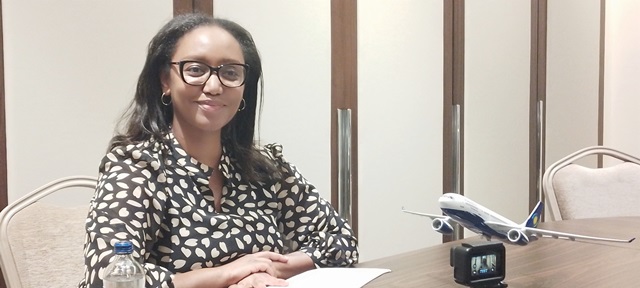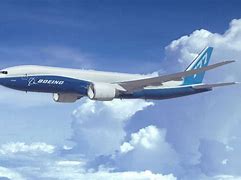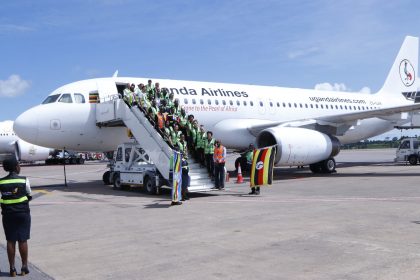There is a brighter side to African aviation – Rwandair’s Yvonne Makolo

Rwandair chief executive officer Yvonne Makolo, became the posterchild of the aviation industry’s new drive for diversity and inclusion, when she was named the 2023-24 IATA Board of Governors chairperson on June 5, becoming the first African and woman to hold the position. Speaking to the African aviation press on the sidelines of the 78th IATA AGM at the Hilton Bomonti in Istanbul, Turkey, Makolo laid out her agenda, ranging from supporting the global airline lobby’s hot-button issues of sustainability, safety, retaining and diversity; to lifting African aviation out of the doldrums, to a point where it can blow its horn on the global stage. But even before that, Makolo believes African Airlines are already making a greater contribution than is often acknowledged. Michael Wakabi attended the briefing:
Yvonne Makolo says she will use her tenure as chairperson of the International Air Transport Association (IATA) Board of Governors, to change the perception of African aviation from negativity, to a status that reflects the continent’s potential and important role that airlines are already playing in connecting the continent.
Makolo scored a double June 5, becoming the first African and first woman to chair the airline lobby’s top organ, when she was named in the role for the year running to June 2024.
“In addition to supporting the IATA initiatives on sustainability, safety, retailing and all the key issues that IATA is focused on, I would like to see African aviation in a more positive light, by showing what we are capable of doing through working with the other airlines, to elevate the quality of aviation within the continent and connecting our continent even better than we are doing right now,” she says.
Africa is home to 18 percent of the world’s population but accounts for only 3 percent of global air transport, a status that Makolo finds “simply unacceptable.”
Although African aviation has often been depicted as unsafe and unprofitable, Makolo says there are many positives going for the continent. It should be appreciated that African carriers have done a commendable job connecting a vast continent in the face of a lot of serious challenges. The cost of operating is very high, skilled labour is in shortage, skies are closed and infrastructure is lacking.
“In spite of all those challenges we are trying to and actually managing to connect this vast continent,” Makolo says.
The African Airlines Association says African airlines carry 85 percent of air passengers within the continent. But the absolute numbers are way below what could be achieved if governments removed restrictions, waved the onerous taxes and charges on carriage and opened the skies to operators.
Less than one percent of Africa’s nearly one billion people travel by air, the bulk of journeys going outside the continent rather than within. IATA has been working with partners such as the African Civil Aviation Commission AFCAC, to achieve just that and also drive initiatives to improve operational safety.
Aviation supports 7.7 million jobs in Africa and contributes USD 63 billion. This could increase exponentially, if connections within Africa increased and the cost of air travel came down.
On the upside, Makolo sees a very young population that can be converted into the bedrock that generates new demand for air travel, drives economic growth and meets the industry’s future needs for skilled labour.
“We can resolve all that by training our young population and getting them to join the sector. There is so much potential for growth given all the gaps that we have within the continent. Africa is the next frontier for aviation and so partnering within ourselves and other players shall help us get to a higher level,” she says.

But the skies first need to open up by governments embracing the Single African Air Transport market SAATM.
“SAATM is a no brainer;” Makolo says “because when you say you want to grow aviation within the continent, there is no way that is going to happen when you have all these restrictions in terms of BASAs that dictate the type of aircraft you are going to operate, which points you are going to enter, how many frequencies you are going to operate and whether they give you 5th freedom or not. That is not going to work.”
And while air travel in Africa is regarded as a luxury, Makolo says it is only so because the combination of travel restrictions and high taxes on the industry make air travel unaffordable.
Speaking about her own pioneering role as the first woman to chair the IATA board, which has made her the poster-child of IATA’s “25by25” gender diversity drive, Makolo says it is good that the industry now recognizes that it is a challenge not having enough women in the industry. However, a lot more needs to be done in a deliberate way because for now 25by 25 is an optional initiative that airlines can take up if they want. Airlines need to be more intentional in terms of bringing more women on board, training more women and giving them the opportunity to excel within the organisation.
“It is a good start but this should be the norm rather than the exception. So am hoping that in the next few years we will see more women taking on leadership roles and taking on a number of these challenges. We should see more equity within aviation not only in terms of diversity but also a big focus on African aviation on the global stage and not from just the viewpoint of African airlines are not safe, African airlines are not profitable, all the negative stories.”

 Brussels Airlines to announce Nairobi service
Brussels Airlines to announce Nairobi service
 SITA promises enhanced travel experience after Materna acquisition
SITA promises enhanced travel experience after Materna acquisition
 Saudia’s 105 aircraft order stretches A320neo lead over rival Max
Saudia’s 105 aircraft order stretches A320neo lead over rival Max
 Boeing refuses to pay hackers $200 million for stolen Data
Boeing refuses to pay hackers $200 million for stolen Data
 Uganda-Tanzania announce date for second joint business forum
Uganda-Tanzania announce date for second joint business forum
 Uganda Airlines leased A320 arrives in Entebbe
Uganda Airlines leased A320 arrives in Entebbe
